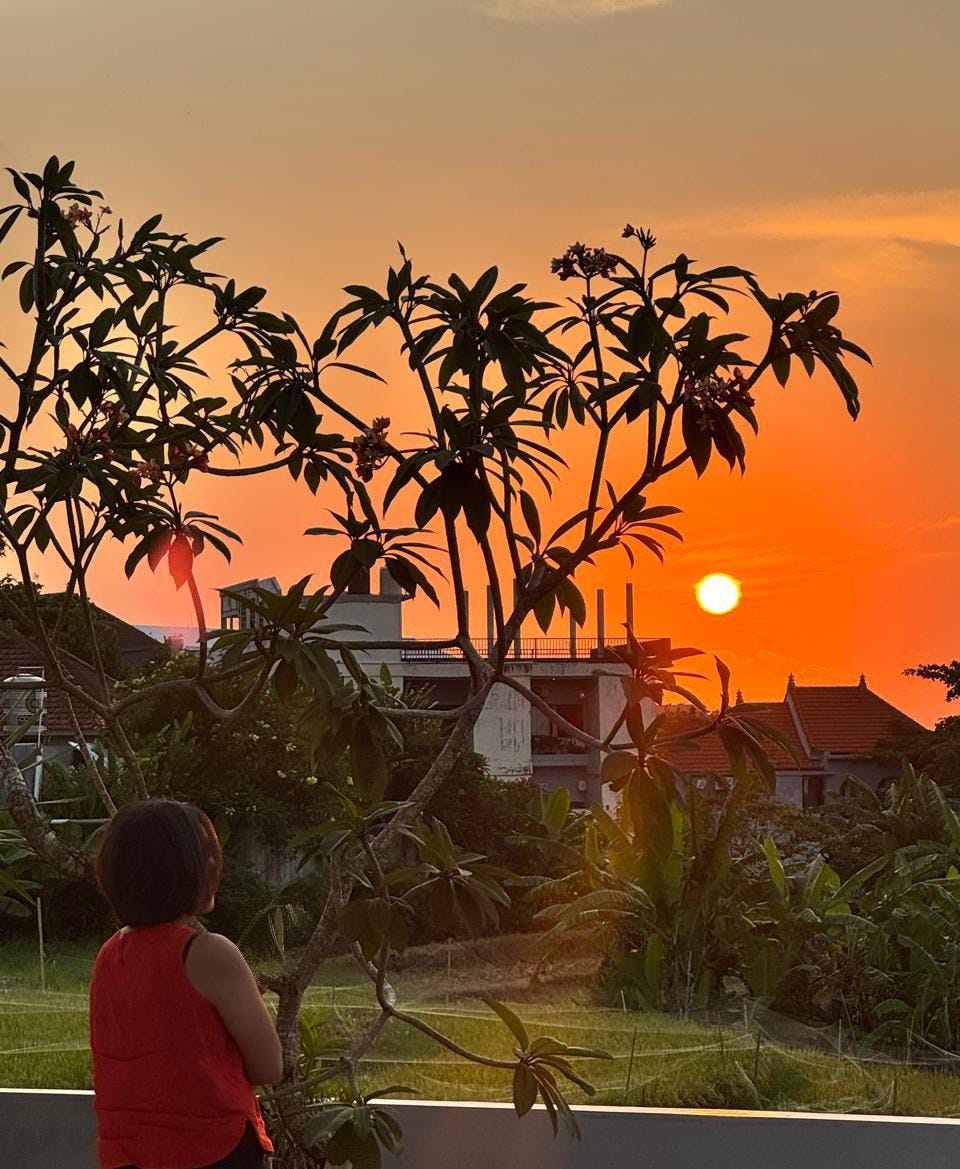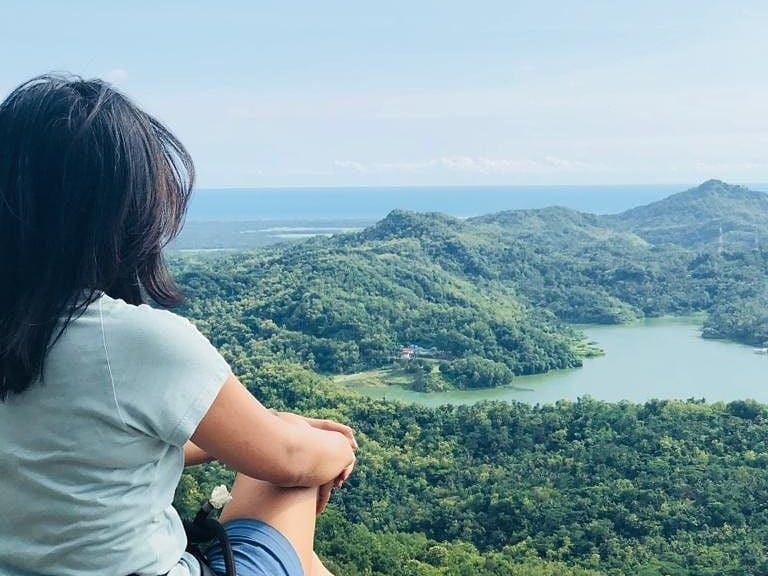I Don't Know Yet - That's Beautiful
The Pause That Teaches. Sometimes, the most honest thing we can say is “I don’t know'' or 'I don't know yet''. In that quiet space, we begin to grow, listen, and learn.
In the hush of my paused rhythm in Bali, where rice fields stretch like verses of an ancient poem and the sun spills gold across the horizon, I find myself breathing deeper—not just air, but memory, meaning, and mystery.
I’ve missed writing. Not from lack of discipline, but from a longing to be honest. To let my fingers speak not just words, but the quiet truths of my heart. Here, in the embrace of swaying stalks and fading light, I reflect on my recent steps. So much I do not know—and I choose to admit it. Because only through surrender can authentic answers rise.
Unknowing: The Foundation of Flexible Wisdom
In modern life, the awareness of “not knowing” is not a weakness—it’s the foundation of flexible wisdom. We live in a world flooded with opinions, data, and conflicting claims of truth. People race to be the most knowledgeable, yet perhaps the clearest minds are those brave enough to say, “I don’t know yet.”
- In writing, this attitude gives birth to living, breathing prose. A writer who embraces unknowing writes not to preach, but to discover. They write with sincere curiosity, with a heart open to ambiguity and paradox. From this space emerge authentic narratives—not ones that pretend to offer answers, but ones that invite readers to ask alongside them.
- In thinking, this awareness trains us to delay judgment. We learn not to jump to conclusions or cling to narrow certainties. It’s not indecision—it’s spaciousness. The world is rarely black and white; between them lies an infinite gradient visible only to those humble enough to observe.
- In relationships, the awareness of “not knowing” opens the door to empathy. We stop assuming we fully understand others. We begin listening not to reply, but to truly comprehend. Relationships shift from mutual evaluation to mutual discovery.
Not Knowing Is Not Embarrassing—It’s Empowering
In a culture that equates confidence with certainty, admitting “I don’t know ” or ‘‘I don’t know yet’’ can feel vulnerable. But in truth, it’s a courageous act of self-awareness. Not knowing everything doesn’t diminish our worth—it affirms our humanity. It shows we are open, curious, and willing to grow.
Embarrassment stems from the illusion that we must always have the answer. But wisdom begins when we release that pressure. When we say “I don’t know,” or ‘‘I don’t know yet'‘ we’re not failing—we’re inviting connection. We’re signalling that we’re teachable, approachable, and real.
This mindset is especially powerful in leadership and parenting. Children don’t need perfect parents—they need honest ones. Teams don’t thrive under flawless leaders—they flourish with leaders who model humility and learning. When we admit we don’t know, we give others permission to do the same. We create cultures of psychological safety, where exploration replaces fear.
Let us reframe the moment of not knowing—not as a gap to hide, but as a doorway to deeper understanding. It’s not a crack in our armor; it’s the light that gets in.
Leadership: The Courage to Not Know
In leadership, the awareness of not knowing is a liberating strength. A humble leader doesn’t impose control—they build trust. They create safe spaces for their teams to ask questions, experiment, and even fail. They understand that innovation is born from the courage to explore the unknown.
This kind of leadership aligns with the principle of self-leadership—the ability to motivate, direct, and regulate oneself toward meaningful goals. A self-led leader doesn’t rely on external authority, but on deep self-awareness and reflection. They become lifelong learners, not just decision-makers.
The Corporate Athlete: Performing Through Awareness
The concept of the corporate athlete—viewing professionals as athletes in the workplace—emphasizes the balance of physical, emotional, mental, and spiritual energy for optimal performance. A corporate athlete doesn’t just rely on technical knowledge, but on resilience, self-awareness, and mental flexibility.
Here, unknowing becomes a strategic asset. A strong corporate athlete isn’t the one who knows everything, but the one who manages uncertainty with calm and openness. They know when to ask, when to listen, and when to pause. They don’t operate from ego, but from a space of reflection and continuous growth.
Integration: Becoming Whole
By integrating the awareness of unknowing with self-leadership and the corporate athlete mindset, we cultivate individuals who are flexible, resilient, and authentic—whether as writers, thinkers, leaders, or simply as human beings.
I am a human being. I am a wife. I am a mother. I am also responsible for leading a team. These roles remind me daily that we truly don’t know everything. With this mindset, I try to learn—every single day—how to be a better mother, a better wife, a better leader, and a better version of myself.
The Questions We Forget to Ask
How often do we truly know our spouse—especially during challenging times?
When words are few and emotions run deep, do we pause to ask what they’re really feeling?
Do we notice the silent burdens they carry, the quiet hopes they hold, the fears they don’t speak aloud?
How often do we truly know our children?
When they shift in subtle ways, do we see it?
Do we recognize when they’re asking for space, or connection, without saying a word?
How often do we truly know our team?
When they struggle, do we ask why—not to judge, but to understand?
Do we see their effort, even when results fall short?
Even within our own family, we sometimes miss the quiet milestones—
When a son matures in silence,
When a daughter steps into a new phase without announcing it,
When a partner wrestles with doubt behind a brave face,
When a team member tries their best and still falls short—not from lack of effort, but from unseen challenges.
Whether through parenting, partnership, or professional life, every moment offers a lesson. And every lesson begins with the humility to say: “I don’t know yet.”
This writing is dedicated to myself—who is still learning, growing, and seeking meaning and also to readers who continue to open their hearts and minds, who wish to understand how powerful not knowing can be as a gateway to life’s wisdom.
Because it is precisely in not knowing that we find space to ask.
In doubt, we learn to truly listen.
And in the courage to admit we don’t know everything, we open the path to becoming the best version of ourselves—with honesty, humility, and sincere hope.
Not knowing is not embarrassing.
Not knowing is the beginning of understanding.
It’s the doorway to asking, listening, and learning.
It’s how we grow, how we lead, how we love better.
With Love - Novi




Beautiful piece - love it Novi!